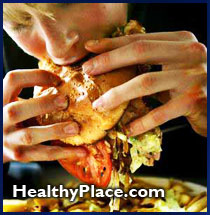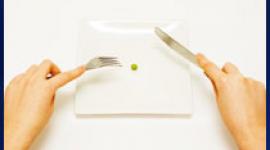Overcoming Overeating with Jacki Barineau

Bob M: Good evening everyone. Thanks for coming tonight. We have an excellent guest tonight and a topic we don't ordinarily discuss too much under the category of eating disorders. That's overeating. In case you haven't noticed, we opened an overeaters room in our chatrooms about a month ago as more and more people with interest in that started coming to our site. Our guest tonight is Jacki Barineau. Jackie is one of the Program Directors of "Overcoming Overeating." The philosophy is based on a book by that same name by Jane Hirschmann and Carol Munter---two psychotherapists. Although Jane couldn't make it tonight because of previous commitments, she highly recommended Jackie and so we are glad to have her here tonight. Good evening Jackie and welcome to the Concerned Counseling website. Could you start off by explaining the philosophy of Overcoming Overeating.
Jacki Barineau: Thanks for inviting me Bob and good evening everyone. The O.O. approach is basically a "non-diet" approach to ending compulsive eating problems. It is based on the premise that dieting CAUSES compulsive eating and weight gain and that by ending dieting and body hatred we can cure the compulsive eating.
Bob M: And that is one of the premises of the program and it's a common one with all eating disorders--that of people disliking their own bodies. How does the "Overcoming Overeating" program address that?
Jacki Barineau: First, we have to decide to let go of the idea of changing our bodies - they may change, they may not. But we choose to accept them just as they are now and let go of "society's" standards of beauty. We clean our closets of all clothes that don't fit or that we don't like. We start dressing ourselves with care and like we're wonderful just the way we are.
Bob M: Now when you talk about compulsive overeating, can you define that for us please Jackie?
Jacki Barineau: As a former compulsive overeater, I can say that for me it meant major food binges that were uncontrollable. The eating had taken over my life and I was drowning in self-hatred. It is being totally unable to stop binging even though you desperately want to stop.
Bob M: And what was it that made you take "action" to change this compulsion?
Jacki Barineau: Many things. Of course I dieted for 25 years (age 7 to 32) - tried Overeater's Anonymous. I felt like a failure. Finally, I was so sick of dieting and worrying about my weight and being obsessed with food, that when I found the "O.O." book I was SO ready to let go of all that. I figured I'd done everything else and was only more and more obsessed and compulsive that maybe trying something totally opposite might be the answer - and it was!
Bob M: Just so everyone can see, here are the building blocks of "O.O.": 1. compulsive eating may seem self-destructive, but it is always an attempt at self-help; 2) Diets never, never solve eating and weight problems. Diets CAUSE compulsive eating; 3) Significant change flows only from self-acceptance; 4) Food is not the compulsive eater's problem, it is the solution. I have read your story Jackie, but I would like you to tell the audience some details of when and why you started putting on weight and your height and weight that you had progressed to?
Jacki Barineau: My problem started at age 7 when I was put on my first diet by my parents. I wasn't even overweight! But that diet began a lifelong battle because it triggered the inevitable binge that dieting always causes. This also led to true weight gain. Then the yo-yo dieting through the years caused more and more weight gain. I dieted my way up to over 250 lbs. (I'm 5'4") before finding "O.O."
Bob M: Now, when you say "O.O.'s" theory is eating your way out of your eating problem, what specifically does that mean?
Jacki Barineau: We "legalize" all foods. It's human nature to crave what's "forbidden". This is why dieting leads to binging. By making ALL foods "okay" and "equal" (in our minds), we no longer will have uncontrollable urges to binge on "forbidden foods". Chocolate = lettuce = cookies, etc. Then we go back to our original way of eating - demand feeding (the way babies are fed). We learn to reconnect our eating with our physical hunger signals. Dieting has destroyed that connection for most of us.
Bob M: So what you are saying is...."O.O." is not going out and drinking powered milkshakes and buying food plans, etc., but really changing your psychological makeup by accepting yourself for who you are and quit trying to be what "Hollywood" wants you to be. It's reconnecting food with hunger rather than trying to fill some psychological need. Am I correct in that?
Jacki Barineau: Exactly! Except that we don't try to stop ourselves from eating for psychological reasons as if that were a "bad" thing. We don't "stop" eating from "mouth hunger," rather we "start" eating from stomach hunger. A very different perspective.
Bob M: Here are some audience questions Jackie...
Netta: Okay, I tell myself that Ben and Jerry's is legal and equal to any other food. How do I stop at a little of it instead of eating the whole carton?
Jacki Barineau: Good question! Everyone assumes that if they legalize these kinds of foods, they'll never quit eating them. In reality, once you're convinced you can have them whenever you want them, you no longer will want so much of them. At first, you will probably need to eat lots to convince yourself it's okay. The key is to NOT "yell" at yourself. We say don't buy just one. Buy way more than you can possibly eat in one sitting. Abundance really helps you to calm down and knowing the food is there whenever you want it, reassures you that you don't have to "eat it ALL" now!
|
|
Bob M: It's the theory of "you want what you can't have." But once you have it, it's no longer that desirable. Here are some questions Jackie:
cw: How do we 'let go" of society's standards, when society regards us with contempt at every turn? Isn't that like telling devastated children to "ignore" kids that beat them up at school?
Jacki Barineau: Exactly. I think it's important to not allow society to dictate how we (or our children) feel about ourselves. It's not easy, but by living our lives fully in the "present" and accepting that nobody has to be the same size, we can start to change how we feel. A good question to ask is: "Who says one thigh size is better than another?"!
cw: What do we do with the justifiable hurt and anger that results from being rejected by society as a result of their standards?
Jacki Barineau: By making a conscious decision to "buck the system and regaining our self-respect, we can then make peace with our bodies. Eventually, we come to the point, we no longer care what "society" says. It has to come from within. The hurt and anger diminish as we learn to love ourselves.
Bob M: To put it another way, no matter who you are, black, white, skinny, heavy, rich, poor, there are going to be people who like and dislike you, for whatever reason. But that doesn't mean "that's who you are".
cw: I can see where 'bucking the system' would make the future better, but you talk about living in the present, which hurts. How do we do that?
Jacki Barineau: "Bucking the system" also helps us in the present. It's very emotionally satisfying to come to terms with yourself and your life, exactly as they are. As far as present hurtful things, all I can say is that nothing can hurt us unless we allow it to. We can "choose" to think and act differently. By being "true to ourselves", no one else can have power over us.
Bob M: And also, I want to make a comment here, you have to look inside your own life and see why you used food the way you do/did? What need did it fill? Just referring back, for a moment to the previous question and answer about getting more than you want, and please be honest, were you worried about putting on more weight? Did you put on more weight, at least when you started that?
Jacki Barineau: Honestly, I was so tired of my whole life being about my body size and about dieting/binging, I didn't CARE. I was so happy to be free from the compulsion, if I never lost another pound, I was still better off. I did gain a little (20 lbs.?) at first, but I would have probably gained more if it hadn't been for O.O..because I was coming off a diet and was in the "binge" part. O.O. has STOPPED the weight gain now and this is so worth it to me.
Miktwo: As I gained the weight I became more depressed, which made me eat more. How do you deal with the depression while you are making the change or taking the action?
Jacki Barineau: Tough one. What I did was to constantly do things that made me feel cared for. We learn to nurture ourselves in new ways. I also used lots of positive self-talk" and treated myself with kindness. By taking these "actions", the "belief" eventually comes.
Bob M: What do you mean by "treating yourself with kindness"?
Jacki Barineau: I worked really hard at NOT yelling at myself or saying unkind things about myself. I wouldn't treat a friend that way! I started treating myself like I would a good friend. I bought nice clothes and "owned" my own closet (who WERE all those other clothes for anyway?!) I started demand feeding, which is VERY emotionally satisfying. It makes you feel your needs can be met.
Bob M: By the way Jackie, because I'm getting some comments from the audience, at 5'4", how much do you weigh now and are you "psychologically comfortable" at that weight?
Jacki Barineau: I no longer weigh myself (my weight is not my business anymore!). However, I'm still a large person. Yes, I feel better about myself now than even when I was down to 150 after a diet! Self-acceptance can come at any size :)
Bob M: Here's an audience comment, then a question:
Echogram: Yes, I've been able to lose weight once I quit dieting Also, I allow myself to have any food I want and now I find I am making better choices and I bought a treadmill and walk on it every and was able to lose inches too.
JoO: If we just 'be' and take the worry out of it, it probably would just happen. Jackie, you are documenting my life. I know if I could do this, I would probably lose weight. But with diabetes and mega-health problems. How does one go about it?
Jacki Barineau: I also have diabetes. I can only say that for me, if I were to make certain foods "off limits", even for "health" reasons, I would end up binging - which would only make things worse! By following O.O. and learning to eat "from the inside out", my body tells me what and how much it needs. Our web site FAQ addresses diabetes - www.overcomingovereating.com/faq.aspl
Bob M: I also want to say Jo, and for everyone here, if you have a health problem, like diabetes, it's important to also consult your doctor. You don't want to do something that kills you.
Also, I have been thinking about the earlier questions and comments regarding "society's standards" and the depression that may result from "being looked down upon". I know from people who visit our chatrooms and from other conference guests, even talking about other disorders, there's a common theme of "find support", people who want to better themselves and help you be a better you. There's a saying: "misery loves company". Be with people who want to better themselves, not drag you down to their point in life.
Jacki Barineau: I'd like to say just one more thing! I know it sounds like we're saying to just "pig out" all the time and not to worry about it anymore. However, in reality we find ourselves eating WAY less when using this approach! It's the fact. We have a "choice" now and no one "out there" is trying to dictate what we eat or how we live. This is VERY empowering! By the way, our website is at: www.overcomingovereating.com. The two books on "Overcoming Overeating" are there, with the ordering info. I highly recommend them!
Bob M: And by the way, while Jackie is still here, I want to add, you'll notice she didn't say she's working her way down to 120 or "model thin". She admitted she is still overweight, not as much as before, but she is more comfortable about herself as an individual than she was in earlier years. And I think that's a key point about tonight's conference also. Thanks Jackie, for being here. For those in the audience, I hope you received some positive information.
Jacki Barineau: Good night!
Bob M: Good Night.
|
|
APA Reference
Gluck, S.
(2007, February 27). Overcoming Overeating with Jacki Barineau, HealthyPlace. Retrieved
on 2024, November 20 from https://www.healthyplace.com/eating-disorders/transcripts/jacki-barineau-on-overcoming-overeating



